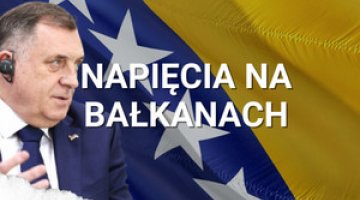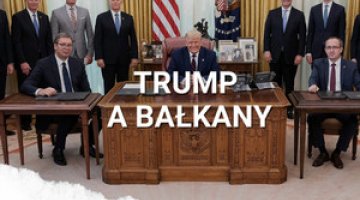Crisis in Bosnia and Herzegovina: a weakened Dodik is seeking support abroad
In recent weeks, the institutional crisis in Bosnia and Herzegovina (BiH) has escalated due to separatist actions by the leader of Republika Srpska (RS), Milorad Dodik. Alongside RS Prime Minister Radovan Višković and the Speaker of the RS Parliament, Nenad Stevandić, Dodik failed to appear for a hearing in an ongoing case that began in December, in which they are accused of ‘undermining the constitutional order of BiH’, including through the adoption of laws prohibiting the operation of central state institutions within the territory of RS. Consequently, on 17 March, a national arrest warrant was issued for the politicians, although they have not yet been detained. Dodik has appealed the verdict sentencing him to one year in prison and a six-year ban on holding public office (see ‘The Dodik trial: a test of strength against Serb separatism in Bosnia and Herzegovina’). Amid growing isolation within the EU and wavering support in Republika Srpska, the leader of the Bosnian Serbs sought foreign backing in late March and early April, through visits to Israel and Russia (he is expected to return to Moscow on 9 May), where he met with Vladimir Putin.
The coming months will represent a serious test of strength for Bosnia and Herzegovina’s central institutions, as well as for the level of international support for its constitutional order. Further actions by Dodik aimed at undermining the cohesion of the state can be expected, along with intensified efforts to secure foreign backing – including as part of his attempts to reduce the international presence in BiH.
Commentary
- The failure to arrest Dodik is deepening the political crisis in Bosnia and Herzegovina, undermining the credibility of the country’s law enforcement agencies, and creating a dangerous institutional and legal vacuum. In early March, the State Investigation and Protection Agency (SIPA) – a nationwide police force with high public trust – assessed the planned operation to detain the politician as ‘highly risky’ and has so far refrained from carrying it out. At the same time, SIPA’s director, Darko Ćulum – a Bosnian Serb who previously served as head of the RS police between 2016 and 2020, having been appointed by a government then led by Dodik – resigned from his post. His resignation followed pressure from the Bosnian Serb leader on officers working in central law enforcement agencies to transfer to RS institutions. However, Dodik’s limited public support is reflected in the fact that Bosnian Serbs employed in SIPA have not resigned en masse. His defence has come mainly from RS authorities. Citing RS legislation, RS Interior Minister Siniša Karan announced that Dodik, Višković, and Stevandić would not be detained. Effectively, this means that RS police will not comply with decisions issued by the central judiciary (see ‘Dispute over the justice system in Bosnia and Herzegovina’).
- In addition to sabotaging decisions of central institutions, Dodik is seeking support abroad. His visit to Israel forms part of an effort to establish a channel of communication with the new US administration. The Bosnian Serb leader had hoped that a victory for Donald Trump would lead to a shift in Washington’s policy towards Bosnia and Herzegovina (including the lifting of US Treasury Department sanctions imposed on him and his aides). To this end, he hired American-Israeli lawyer Marc Zell; however, contrary to Dodik’s expectations, his actions have so far been met with open criticism from US Secretary of State Marco Rubio. Dodik also used his participation in a Jerusalem conference dedicated to combating anti-Semitism to highlight what he described as the threat posed by ‘radical Islam’, which, in his view, makes peaceful coexistence with Muslims within a single state impossible.
- The meeting with Putin was significant for Dodik, as it was intended to demonstrate support for his demands from a permanent member of the UN Security Council – namely, Russia. These demands include reducing the international presence in BiH, most notably through the closure of the Office of the High Representative (or at least a significant limitation of its powers). Putin’s adviser Yuri Ushakov, who is involved in negotiations with the Americans regarding the Russia–Ukraine war, was also present during discussions. It cannot be ruled out that Dodik is attempting to make the issue of BiH part of the broader dialogue between Moscow and Washington. His proposed withdrawal of the international presence from the country – which includes foreign judges and the EUFOR Althea peacekeeping mission – would pose a serious threat to BiH’s stability and security. The annual vote on the extension of the mission’s mandate for another year is held in the UN Security Council in November.
- The crisis in BiH represents a test of the European Union’s credibility and responsibility towards a candidate country. For many years, voices within the EU have called for Milorad Dodik to face consequences for his separatist activities. However, a decision on EU-level sanctions, which requires unanimity, has been blocked by certain member states including Hungary and Croatia. Individual member states are free to impose their own measures. Austria and Germany have taken such action by banning the three most senior RS politicians (Dodik, Višković, and Stevandić) from entering their territory. Since 2022, the Bosnian Serb leader has also been sanctioned by the United Kingdom.




